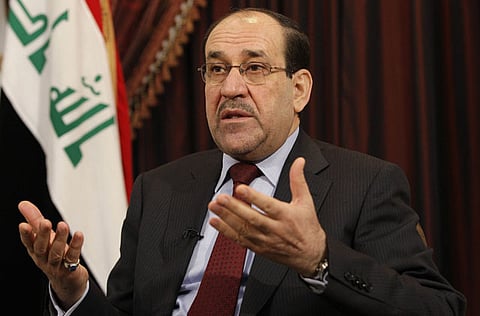Al Maliki victory expected as Iraq results due
Leaked reports say Al Maliki’s bloc would win around 90 out of 328 parliament seats

Baghdad: Election results due Monday are expected to put Nouri Al Maliki in the driver’s seat to remain Iraq’s prime minister for a third term despite vocal opposition and markedly worsening security.
The tallies from the April 30 general election, delayed for weeks due to a litany of complaints according to the electoral commission, are likely to show Al Maliki’s bloc won the most seats in parliament but fell short of a majority.
That would mean the incumbent, who hails from Iraq’s Shiite majority, would require the support of Sunni Arab and Kurdish parties.
But many of these have refused to countenance another term for Al Maliki, who they accuse of consolidating power and being to blame for a protracted surge in unrest.
Iraq’s electoral commission is expected to release the results, which remain subject to challenge, at 1200 GMT.
Leaked reports released by political parties and reported by Iraqi media throughout the vote counting process have said Al Maliki’s State of Law alliance would win around 90 out of 328 seats in parliament.
A handful of smaller parties — including those linked to former premier Eyad Allawi, powerful Shiite cleric Moqtada Al Sadr, and Kurdish regional president Massud Barzani — are estimated to each win between around 20 and 30 seats.
Regardless of the final results, the government formation process is expected to take months as the various parties are likely to seek an all-encompassing government package, including the selection of the president and the speaker of parliament.
Under a de facto agreement between Iraq’s communities, the prime minister is a Shiite Arab, the president a Kurd and the parliament speaker a Sunni Arab.
The election and its aftermath come amid a year-long surge in violence that has left more than 3,500 people dead this year, fuelling fears Iraq could be slipping back into the all-out conflict that left tens of thousands dead in 2006 and 2007.
The run-up to the vote, Iraq’s first since US troops withdrew at the end of 2011, was plagued by attacks on candidates and campaign rallies, and allegations of malpractice that contributed to lower turnout in areas of the country populated by disgruntled minority Sunnis.
But it has nevertheless been hailed largely as a success by the international community, with the US and UN praising Iraqi voters for standing up to militancy.
Sign up for the Daily Briefing
Get the latest news and updates straight to your inbox



